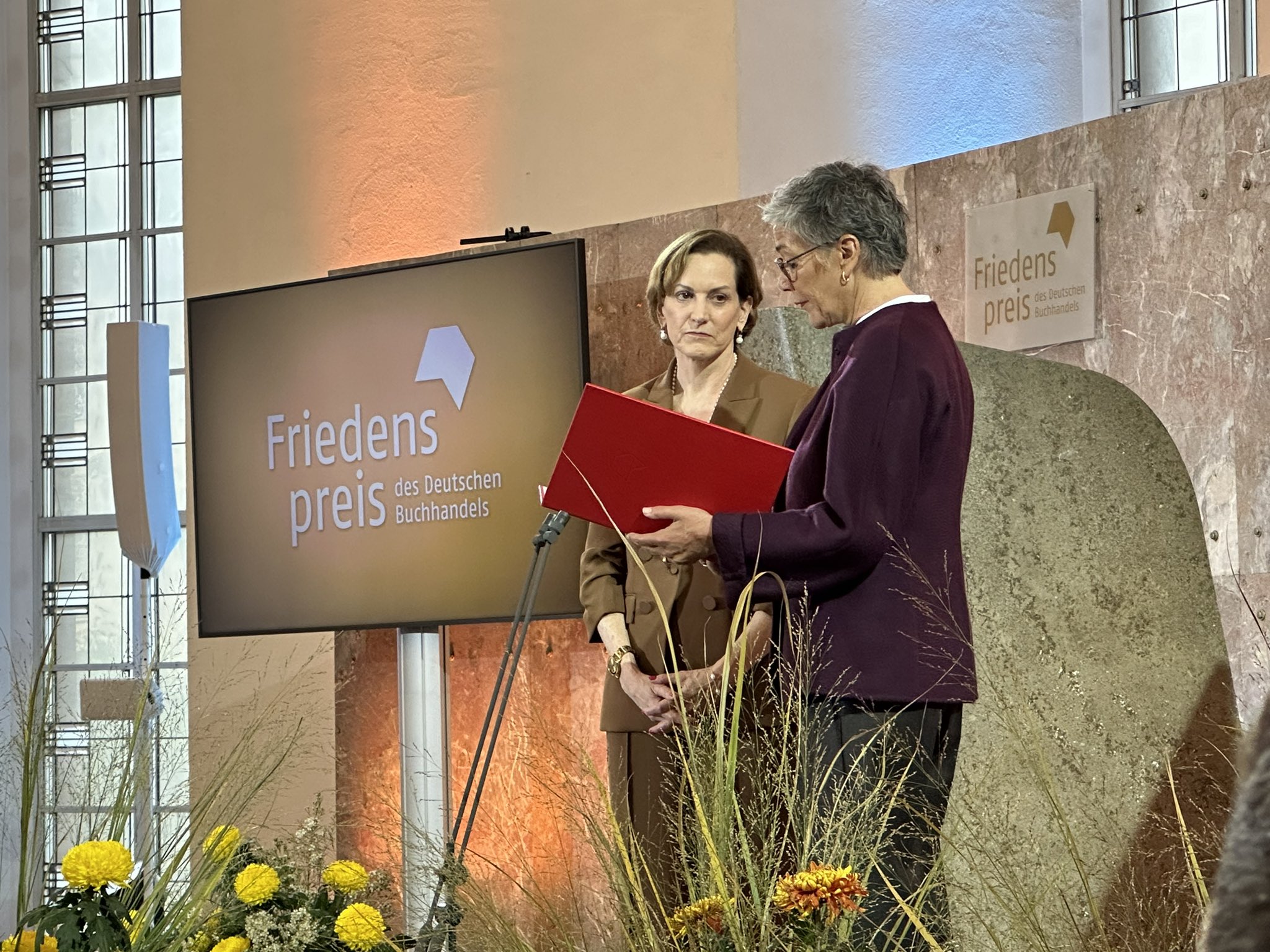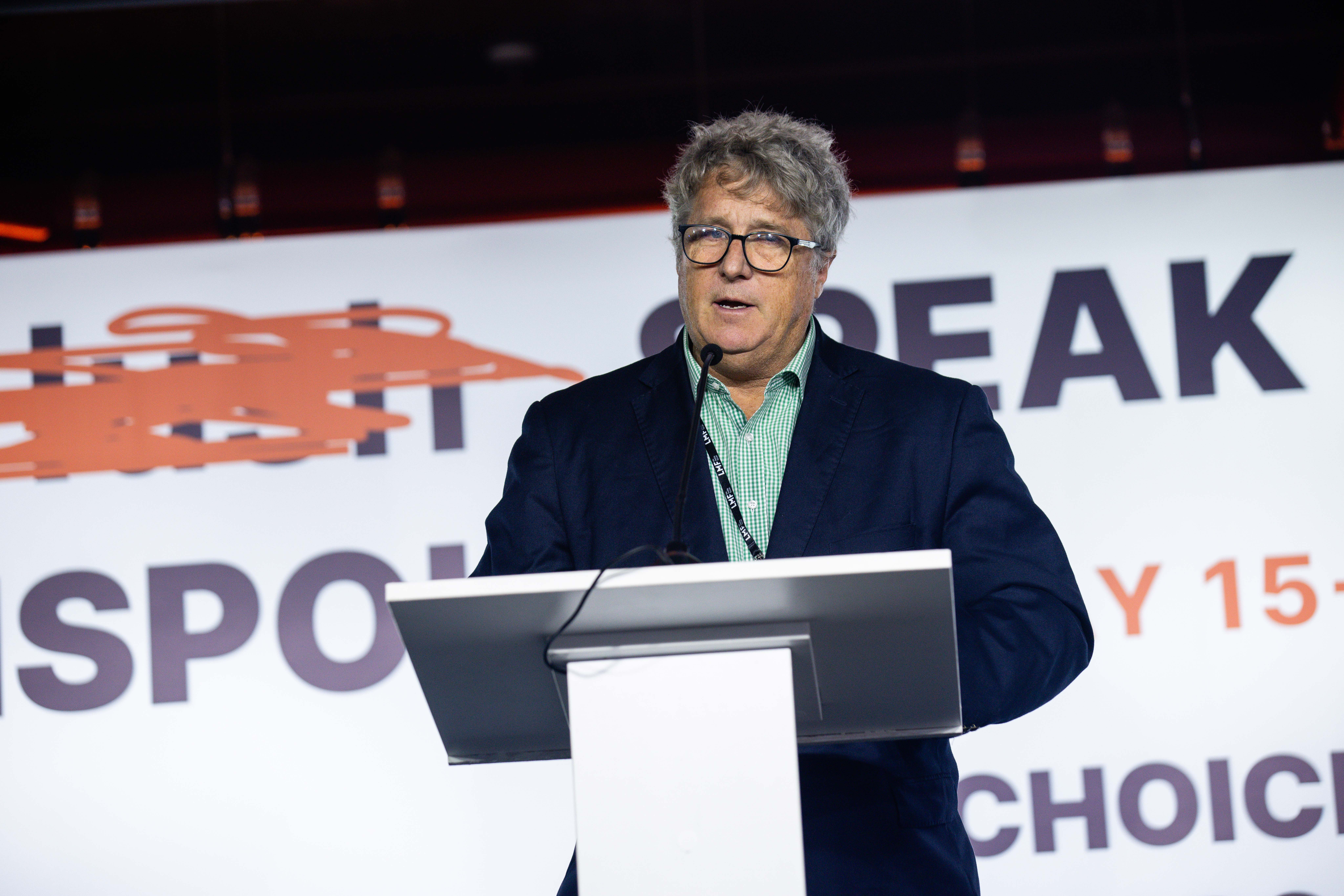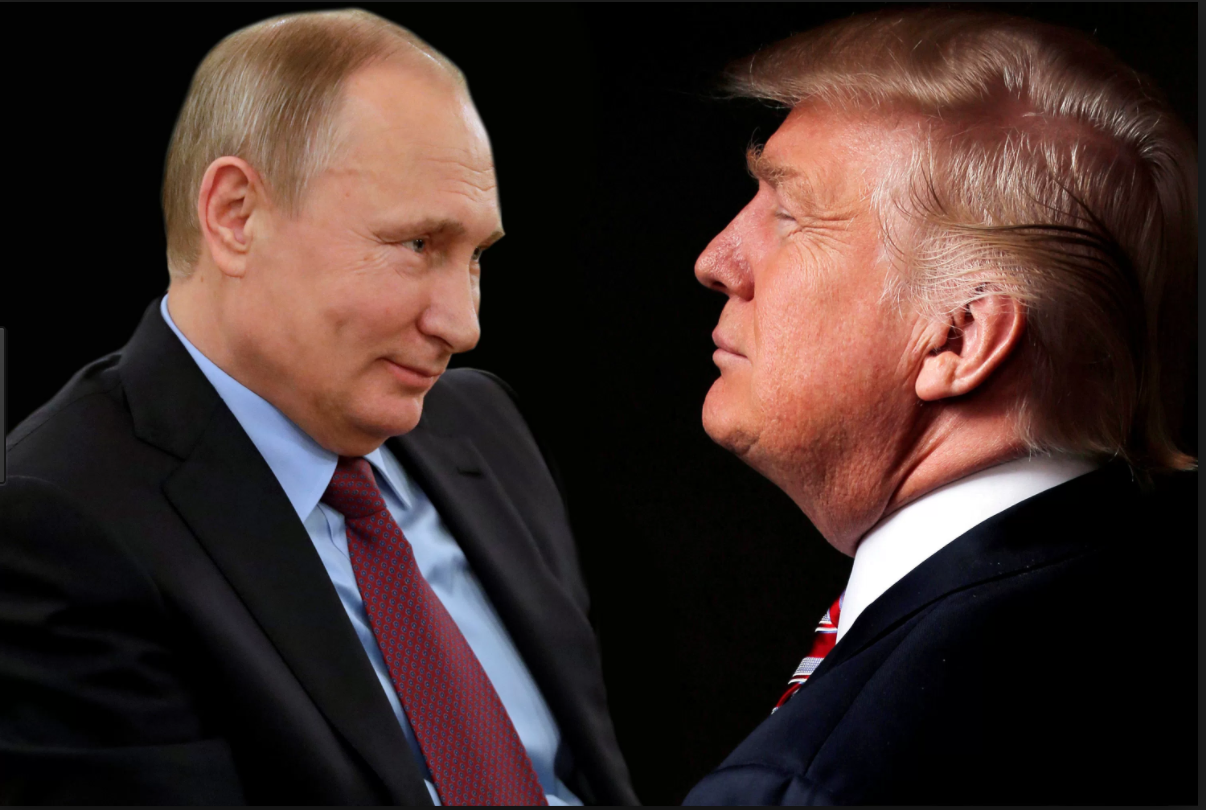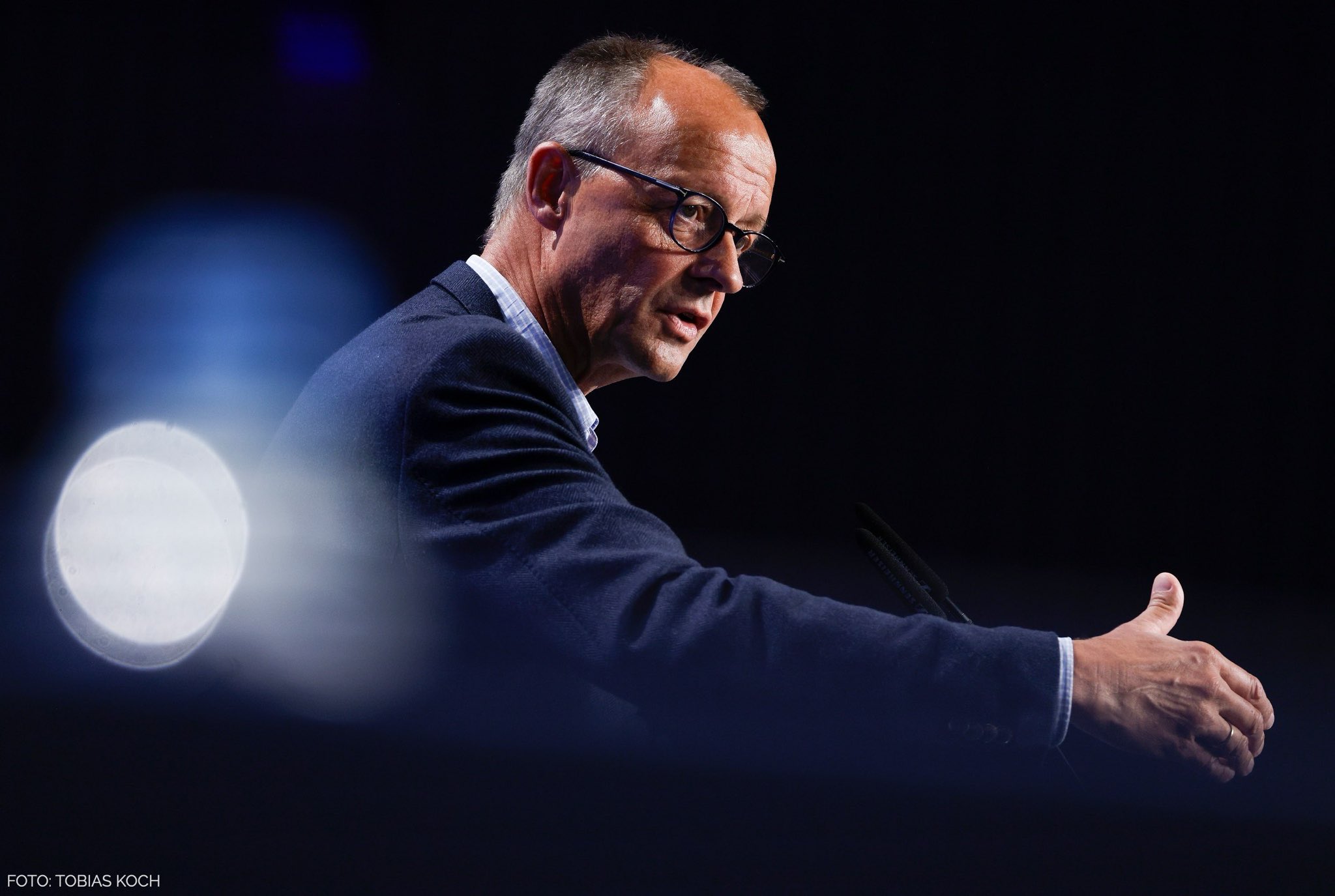What happens when a top mind on authoritarianism joins Ukraine’s media fight?
At the 2025 Lviv Media Forum, Pulitzer Prize-winning journalist and historian Anne Applebaum joined a high-profile panel to unpack the global war for democracy — and Ukraine’s role on its frontlines.
In this piece, we bring you the standout moments from Applebaum’s panel remarks and her candid responses at the press conference that followed.
The questions and answers were edited for clarity.
“Ukraine plays a crucial role in the global battle between autocracy and democracy”
I’ve actually been writing about Ukraine for 30 years. My first visit was somewhat accidental — as a student at Leningrad University in 1985, I took a train from Leningrad to Vienna that stopped in Lviv. I got off and explored for six hours. This brief encounter was eye-opening because Ukraine clearly didn’t resemble Russia — it was obviously distinct.
In my first book, Between East and West, published when I was in my mid-twenties, I dedicated an entire chapter to Ukraine. The book, published around 1993-1994, chronicles my journey from Kaliningrad to Odesa through Western Ukraine. Ten years ago, I also published a history of the Ukrainian famine, Red Famine.
I feel a certain responsibility toward Ukraine. When Russia invaded in 2014, I realized there were few Western media voices knowledgeable about the situation.
While living in London, I often found myself on BBC programs debating Russian propagandists — representatives from Voice of Russia who spoke English would be invited on air. I continued this work because I felt that if I didn’t speak up, nobody would.
Since 2014, I’ve recognized that Ukraine plays a very important role in Putin’s strategy and in the global ideological battle between autocracy and democracy.
Ukraine’s significance extends beyond the Ukrainian people themselves: this conflict represents a broader question about the survival of European civilization.
As events have unfolded since 2022, and particularly following the most recent US election, I believe this perspective has only grown more relevant, not less.
Why Putin fears Ukraine’s democracy
I didn’t mean to suggest that Maidan was primarily driven by corruption and economic factors. Rather, I noted that many of the protest slogans were anti-corruption in nature. The EU flags present at demonstrations were significant too.
My understanding is that Maidan represented something deeper — a movement that was fundamentally pro-rule of law. Ukrainians were demanding that their country become a genuine democracy where laws are respected and applied fairly. This is how I interpreted the essence of Maidan.
This precisely explains why Putin found it so threatening.
He operates within a system that combines kleptocracy with autocracy — where those in power steal resources, conceal their theft, and suppress anyone who attempts to expose their corruption. I understood Maidan as Ukrainians decisively rejecting this type of governance system.“A Maidan-like event is unlikely in the US”
Many Ukrainians anticipate a Maidan-style uprising in the US, drawing from their own political experience. However, this might not be the appropriate response for America’s current situation.
People’s opinions about their voting decisions vary. One Trump supporter in my circle likely won’t change her mind because she made an informed choice despite his controversial character. Having committed to this decision, she’ll likely stand by it rather than reconsider.
A Maidan-like event is unlikely in the US currently. Americans still have multiple democratic avenues available — ongoing lawsuits moving through courts and upcoming midterm elections in 18 months.

Democratic politicians remain active and vocal. Many representatives and senators continue working, though their efforts may be less visible from abroad.
The political system needs time to function. Congress should typically restrain presidential overreach, particularly regarding tariffs — constitutionally a congressional responsibility.
The Senate’s allowing the president to impose tariffs under claims of emergency has already transferred significant power away from the legislative branch. Meaningful restraint would require only about five senators and ten House members to change their positions, but we haven’t reached that point yet.
Putin is richer than 20th-century dictators
My book Autocracy Inc. describes a network of dictatorships without a common ideology, unlike the Soviet bloc. We’re talking about communist China, nationalist Russia, theocratic Iran, Venezuela, Zimbabwe — a wide range of countries with different interests.
What holds them together isn’t a common set of ideas or vision, but rather shared interests, many financial. The leaders of these countries aren’t just wealthy; they’re billionaires. In some cases, we don’t know why or how they acquired this wealth.
We know Putin is very wealthy, but the opacity and secrecy surrounding their finances is part of what makes them dictators and maintains their power.
Compared to 20th-century dictators, they are simply richer. They have more sophisticated methods of stealing and hiding money, and they use that wealth to build power and spread influence not only in their own countries but also in democracies.
They collaborate to build common narratives, though these aren’t strictly ideological. Rather, they present dictatorship as stable and safe while attacking democracy as weak, divided, and degenerate. These narratives echo across different regimes despite their varied contexts.
They’re united in their desire to push back against the language of democracy, rule of law, transparency, accountability, independent courts, and human rights.
When Putin invaded Ukraine, one message from Ukrainians was that this wasn’t only a war against Ukraine — it was a war against international law itself, a war against the very idea of law.
“What unites Trump and Putin is their use of virtuality”
One of the purposes of the 2022 full-scale invasion was to demonstrate that “we, Russians, don’t care about the law. We don’t care about laws on war, conventions on genocide, or laws protecting rights or children. We can do what we want, and we’re going to prove that law doesn’t matter.”
From the beginning, part of Putin’s goal has been to show that the international system doesn’t work and cannot hold him accountable.
I doubt very much that Trump has thought through his actions in the same way, but certainly there are people around him who understand that what he is doing is a demonstration that “I’m going to show you that the law doesn’t work.” In the next six months, we will find out whether the law works or not.
Another common thing between Trump and Putin is their use of virtuality.The Russian political philosophical tradition was rich with the idea that “I have a great fantasy, and if reality doesn’t correspond with this fantasy, that’s bad for reality. I will change reality according to my fantasy.” Bolshevism was a key example — building a proletarian state in a country with no proletariat.
What happened with Trump is similar: he has a fantasy that doesn’t correspond to reality. All the educated people say it doesn’t correspond to reality, that it’s false and fake. Yet he insists on making this fantasy stronger than reality itself. It’s a kind of surrealist politics.

“Making citizens apathetic to politics is a deliberate strategy”
There’s a slight nuance in Europe that differs from America: Europeans genuinely have a problem in that their institutions don’t fit the current moment.
The European Union as a whole — especially if you add the UK — is the richest and most powerful economy in the world. It could easily have the richest and most powerful army in the world, but it isn’t structured for that. It wasn’t built for that purpose.
It was built for an era when there would be no more wars, because the last war was World War II and there would be no wars in the future. Although some countries have militaries — it’s not that there’s nothing — there isn’t a way of unifying them into a single more powerful entity, and that entity was NATO.
But now we have a US president who is less committed to NATO, and who is willing to undermine and attack allies, which he has done repeatedly since becoming president, actually for the last six to eight years. This has almost destroyed the central organizing principle of NATO, and it isn’t clear how to recast or rebuild it.
That’s not just a philosophical problem; it’s also an institutional problem without an immediate or obvious solution.
There are plenty of Europeans now — people keep saying to me, “Oh, Europeans live in a dream world. They don’t understand what’s happening.” No, many Europeans understand well. They understand Russia is a threat.
They understand the war in Ukraine is dangerous. They understand that Russia threatens them in the cyber world, through sabotage, and in many other ways. They understand that the US is now led by somebody who is, at the very least, unenthusiastic about them. They all understand it.
There isn’t a clear path. There isn’t a single leader or institution or European army that can address this. This is a deeper kind of problem because the world that Europe created for itself after 1945 didn’t imagine existing apart from and away from the United States.
The presence of Xi Jinping at the parade in Moscow was a clear sign that they want to do a Kissinger in reverse. They want to take Russia away from China like Kissinger took China away from the Soviet Union. It’s not possible. China and Russia are very close. It was never possible.

Three reasons why Trump’s strategy to split Russia and China risks strategic blowback
“Trump imagines the world as a contest between powerful people”
I am not able to explain the mind of Donald Trump. I can just tell you what he says. Maybe it changes from hour to hour, but this is what he says. Either today or last night he said, “You know, the war only happened because of Joe Biden. If Joe Biden had not been there, then Russia would not have invaded Ukraine.”
His understanding was that once he became president, since Putin likes him, Putin would stop the war. It would be enough for him to put some pressure on Ukraine, say some nice things about Russia, send Steve Witkoff to Moscow to show we’re friendly again, and that this would end the war.
I actually think this is what he believed. And remember, he doesn’t know any Russian history. He doesn’t know any Ukrainian history. He doesn’t know deep history. He doesn’t know the history of the last 10 years.
He imagines the world as a kind of contest between powerful people. There are no deeper forces or a longer story. And he doesn’t know this backstory, so he doesn’t think it exists. As far as he’s concerned, Putin invaded Ukraine to show that Biden was weak, and now that Biden is gone, he will leave.
And we’re now in the process of Trump learning that this is not true. I don’t know what will happen next. This would involve sanctions on countries that buy oil and gas from Russia, which would be a big change. He’s been absolutely reluctant to do so and has refused to put any pressure on Russia at all.
Sometimes he writes things on social media: “Vladimir, stop it!” He lives in this world of performance. Everyone is performing, so he must assume that Putin is also performing and he can just end the performance. Again, there is a deeper goal that Putin wants to just destroy all of Ukraine — he’s just maybe learning this now. So we’ll see.
“Germany could play a crucial role in bringing other nations along”
Mertz understands the importance of Ukraine. He recognizes how changes in the US have altered Germany’s position within Europe. The question is whether he and his coalition can mobilize to create meaningful change — not only producing weapons for Germany but also seriously considering the establishment of a European Defense Force and its potential structure.
These are really big issues. This isn’t just a war of ideas. It fundamentally concerns institutional transformation and restructuring NATO so the United States isn’t central to everything. Currently, an American serves as the main commander.
The command and control systems connecting NATO countries are entirely American. If America withdraws, it’s like you’ve cut the head off the chicken. It doesn’t have a way of coordinating itself. This entire system requires reinvention.
It would be really great if Germany were a big player in doing this, given its status as Europe’s largest economy and its robust defense industry. They could play a crucial role in bringing other nations along. From his statements, the new German chancellor seems to comprehend this, but whether he is able to do it, I don’t know.
We should acknowledge the key defense leaders currently involved: Macron, Merz, and Starmer. They all comprehend the situation. Additionally, when considering the leaders of all Scandinavian countries and Baltic states, they too understand what’s at stake. However, whether they can implement rapid action remains uncertain.
Poland will stay consistent in supporting Ukraine
I don’t think the Polish election will change much in terms of Poland’s relationship with Ukraine, regardless of who wins. Even if the far-right party were to gain influence — they currently hold about 10% support — while that would be significant, it seems highly unlikely.
Both main candidates, one from Platform and the other from Law and Justice for Peace, represent parties that have consistently supported Ukraine’s war effort. I don’t believe the presidential outcome will alter this position.
Obviously, the presidential election will have a huge effect in Poland. Internal Polish politics would be very different depending on who wins. However, regarding Poland’s stance toward Ukraine, I don’t think it’s hugely different.
“It doesn’t feel like Ukraine is about to fall”
It doesn’t feel like Ukraine is about to fall. I haven’t thought about that question in a long time, as it doesn’t seem realistic. The Russians have been trying to conquer Chasiv Yar for nine months without success. We are not at a moment where Ukraine’s collapse is imminent.
The consequences would be catastrophic. It would devastate Europe’s economy and security, while sending dangerous ripples worldwide. Taiwan would face increased vulnerability. Latin American dictatorships, particularly in Venezuela, would be reinforced. The effects would reverberate globally in numerous concerning ways.
“I’m inspired by the resilience of Ukrainians”
This is maybe my 8th or 9th trip to Ukraine since February 2022.
I’m inspired by the resilience of Ukrainians. I’m inspired by the creativity of Ukrainians. I feel lucky to know both people in the volunteer world here who have created institutions that have lasted, that continue to serve people despite the stress of war and the need to raise money, and have managed to keep going.
I’m lucky to also know people in the world of defense technology who have been dedicated to making sure that Ukraine is on the cutting edge of every new idea and the creation of it.
There’s really almost no country in the world right now, which as a society puts so much energy both into self-defense and self-care into taking care of veterans.
These are all symptoms of a really healthy society even if it maybe doesn’t feel like that if you actually live here.
Read also
- Russia called this British bomb expert a ‘terrorist.’ He defused 6,000 mines in Ukraine until one killed him
He found toys in a Russian trench. That’s when he knew he couldn’t leave.
- The EU knows how to stop Russian energy – it just won’t
The EU knows how to stop Russian energy – it just won’t
- Romanian voters reject “make Romania great again” as pro-Western candidate wins
Romanian voters reject “make Romania great again” as pro-Western candidate wins








